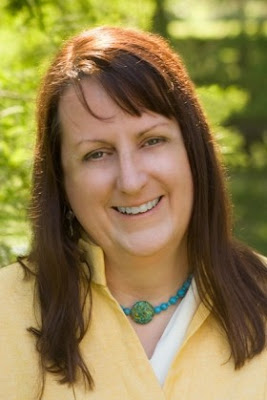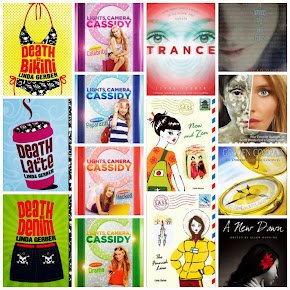 at query? This tip is for you. It comes to us from Dee Garretson, author of MG adventures, including her latest, WOLF STORM.
at query? This tip is for you. It comes to us from Dee Garretson, author of MG adventures, including her latest, WOLF STORM.Dee grew up playing in Iowa, playing in the woods, helping her dad with his inventions, and writing stories. She earned a degree in international relations, then realized sitting at a desk was not her thing. She went back to school to get a degree in landscape horticulture and taught that for a few years. Finally, she decided writing was where it's at... and here she is!
 Here's the official blurb on WOLF STORM:
Here's the official blurb on WOLF STORM:The movie is Stefan’s big break. He’s on location in the mountains far from home, acting in a blockbuster sci fi adventure. The props, the spaceships, and the trained wolves on set should add up to a dream job, but acting turns out to be much tougher than he ever imagined, and he feels like his inner loser is all that’s showing through.
From the way his famously stuck-up co-star, Raine, treats him, he’s pretty sure she thinks so too. And worst of all, no one will believe his claim there are wild wolves haunting the forest around the set.
When a blizzard strikes, isolating the young co-stars and bringing hungry feral wolves into the open, Stefan must take on his biggest role yet-working together with his costars to survive. With no second takes, they only have one chance to get it right.
Lights. Camera. Action!
You can find Dee online on her website, on twitter, and on vodpod.
Dee says:
Most writers loathe writing query letters, and I did too, until I learned how to concentrate on distilling the important parts of the story I was describing. It’s hard to judge your own story with all the secondary characters and subplots clamoring for attention, so I’ve found it helpful to practicing by writing queries based on classic books or movies. In honor of October and Halloween, I decided to do a sample query based on Mary Shelley’s FRANKENSTEIN. Before I write any query, I answer some questions:
1. Who is the main character and what about him/her is interesting?
2. What does the main character want at the beginning of the story, and if it changes, what does he/she want later on?
3. Who is the antagonist, or what is preventing the main character from obtaining his/her wants?
4. What are the stakes if the main character fails at obtaining the goal?
Based on how I answered those questions for FRANKENSTEIN, here’s the main part of the query:
Victor Frankenstein, a brilliant young scientist, is obsessed with discovering the secret of life. He prowls the cemeteries and charnel houses of 18th century Bavaria, determined to unlock the mysteries of life and death. After years of work, he succeeds beyond all his expectations, managing to bring life to a creature made from body parts of the dead. The scientist’s elation at his success is brief. It disappears the moment the creature opens its eyes and Victor realizes he has created a monster. Distraught at the horror of his creation, he unwittingly lets it escape into the night.
Tormented by the knowledge of the creature’s existence, Victor dreads the reappearance of it in his life. He never imagines how terrible the return will be, until the monster murders Victor’s brother. When Victor confronts the creature, it vows to kill all of the rest of the scientist’s family and friends unless Victor creates another monstrosity, one that could be a companion to the monster in all its loneliness and misery.
Victor is faced with a choice-appease the monster by doing as it wishes, or follow his conscience and face the consequences of a creature set on revenge. When Victor chooses, the monster kills Victor’s dearest companions, driving Victor on a hunt that takes him to the icy regions of the Arctic to find his creation so he can destroy it. The chase will end in the death of one or both.
Actually, both Victor and the monster die in the end in non-glorious ways. I suspect if this story were written today, Victor and the monster would engage in a hand-to-hand battle, the monster would fall into an ice crevasse, leaving Victor to believe the monster is dead. Since the ending should be open enough for a sequel, the monster wouldn’t actually die. He’d merely be injured, so that in book two he could come back to take over the world with his army of polar bears angered by global warming.
Notice I didn’t mention Victor’s fiancée, Elizabeth, who is killed by the monster right after the wedding. Introducing her and the circumstances of her death would show there was a bit of romance in the book, but the added length would far outweigh the benefit of describing this subplot. This query is already longer than some. You will often run across advice to keep the description under 200 words, but if the story demands a lengthier description, so be it.
I also didn’t mention how this story is told by Victor as he is on his deathbed on a ship trapped in the ice of the North Pole. Again, that would add way too many details. It’s not the real setting of the story and it’s not important for the purpose of a query letter. It would be tempting to go into detail about the monster, but trying to explain an eloquent eight-foot tall creature with black lips overwhelmed me, so I didn’t attempt it, and I don’t think the query needed it.
Sometimes, a query-writing attempt may tell you your story needs more-higher stakes, a more defined antagonist, or a more unique main character. That’s why it can be a good idea to write a query even before you start a story. It can make the whole long process much easier. I have another example on my blog where I wrote a query based on The Wizard of Oz. Here’s the link:
This Week's Links:
Reading Out Loud - Not Just For Kids (Writer Unboxed) Casting a spell.
How Do You Know When You Have a Great Idea? (Writing Bar) Video
Outline Schmoutline (Jaye Wells) Another look at storyboarding.
Where Elephants Are Waiting to Fly (Karen Rivers) "I've always wanted to write a book..."
Is There an App for That? (Novel Matters) Index Cards
What is a Story? (Jane Friedman)
25 Things Authors Should Know About Theme (Publetariat)
15 Point Checklist to Make Your Writing Come Alive (Write to Done)
8 Writing Tricks You Won't Read Anywhere Else (Gatekeepers Post)
7 Character Types that Build Your Story (Adventures in Children's Publishing)
7 Tips to Improve Your Novel's Pacing (The Other Side of the Story)
6 Keys to Opening Up New Possibilities in Your Story (Words and Such)
5 Ways to Keep Your Writing Engine Running (Write it Sideways)
5 Essential Tips for Creating a Children's Book (The Creative Penn)
Writing High Concept (Harry Potter for Writers)
Writing From the Teen Perspective (YA Confidential)
Teendom (Word for Teens) Excellent.
Ready, Set... Where's the Action? (The Other Side of the Story) Maintaining tension in scenes.
Gettin' Physical: Character Description (Beyond the Margins) A few good rules to remember.
Now go. Write.







